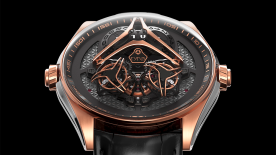Millennials are everywhere. They are your nephew, your neighbour’s daughter, the Uber Eats delivery chap who delivers your Pad Thai cold and 20 minutes late. But they are also the archetype of the customer that you absolutely have to target if you want to survive. In short, they are born between 1980 and 2000, they consume, they are committed to their act of consumption and add ethical and ecological considerations to it. They are nonchalant, they have a purchasing power of tens of billions of dollars at the global scale. Basically, these chameleons with rather indistinct contours can walk on water. The millennial is the philosopher’s stone of the luxury industry. He or she turns everything they touch into gold… even if they don’t touch anything at all. Potential access to this customer base alone is what led the Movado Group to pay 100 million dollars for the entry-level MVT brand (turnover: 17 million dollars!)… and with a promise to fork out more if the brand is a success.
But we should stop daydreaming and listening to everything people tell us. The millennial doesn’t exist, just like generation X or Z, the yuppy, the dink and the metrosexual. These vast and vague concepts hide an entire industry of condescending consultants and trend hunters who continually change tack. They power a machine that encourages us to embrace, exaggerate and to group together behind a buzzword people who they claim are flush with money. To listen to them, to hear their chorus, is at best a manifestation of laziness.
We need to take a step back. Are we really expected to believe that people who are probably still in their first job represent a level of purchasing power that can sway the luxury watch industry, where the barrier to entry is around 1,000 euros? Think of the brands who are trying to attract just such customers with entry-level prices three times this figure. “Their parents are rich, they can buy them the watch!” you may retort. But that’s not what we are being told. They buy online (a sales channel whose importance is still negligible for watches). They make their own choices (although given how they follow each other on Instagram and the impact this has had on brands like Balenciaga, Gucci and Supreme, I do wonder). They research things thoroughly on the Internet (and then they buy Apple Watches that they are going to throw away in six months – give me a break!). They are concerned about the environment (in some developed countries maybe, but not in countries like India and China, where billions of people are working towards affluence).
Watch brands who have become disoriented by sales problems have walked right into a marketing trap, and not for the first time. In this case, it’s the trap of youthism! Having watched sub-smartphones sell in their millions just because they have an apple on them, while they struggle to shift their beautiful mechanical watches full of gear wheels, they thought they were past it. That they are considered tacky. That they have disappeared from the mental radar of an entire generation, across the entire planet, comprising a few hundred million people, as if they were a huge single block.
And there you have it. A 19 year-old poke bowl seller in California has very little in common with a 39 year-old tyre seller in Guangxi. Nor does a tattooed Norwegian vegan who sells caffe latte at 55 Krn have much in common with a spectacled Brazilian student whose parents are struggling to finance his studies as a mechanic (much to the latter’s dismay). There are light years between my sister, who is studying in England, and the girl who helps to fill her shopping bags. They consume the same objects and services whose colossal planetary reach seems to link them. Apple, Facebook, Tinder, Nike, Chipotle and CBD cosmetics are not enough to make a community of thought, or a unit of behaviour. Millennials don’t exist. Deep down, you know it, because you’ve met them, too.







